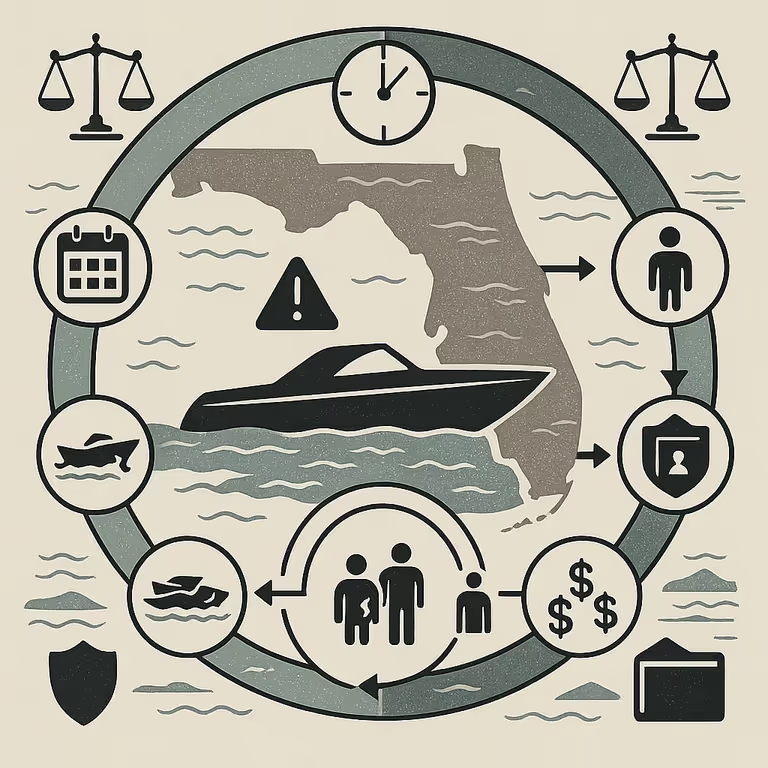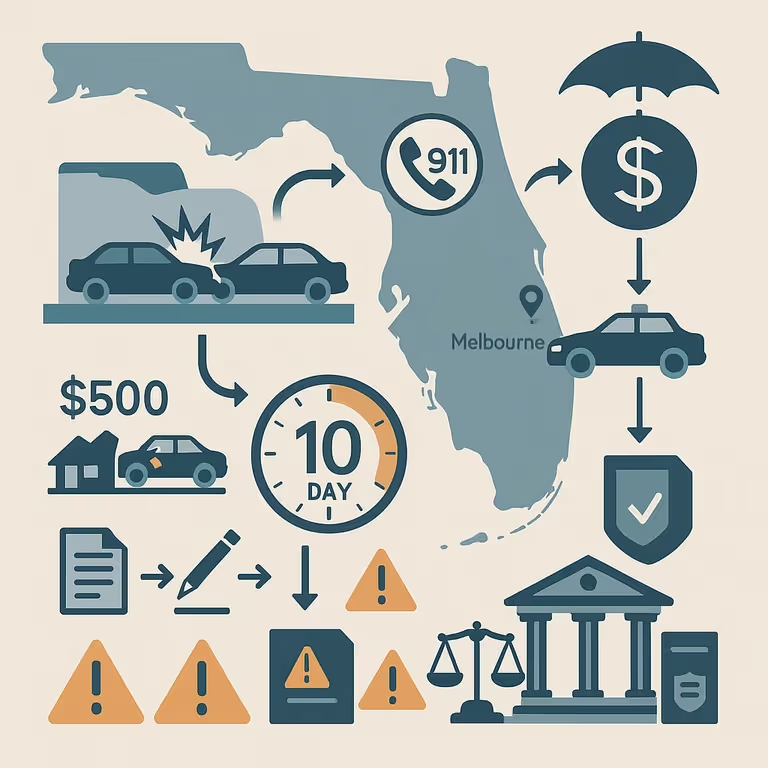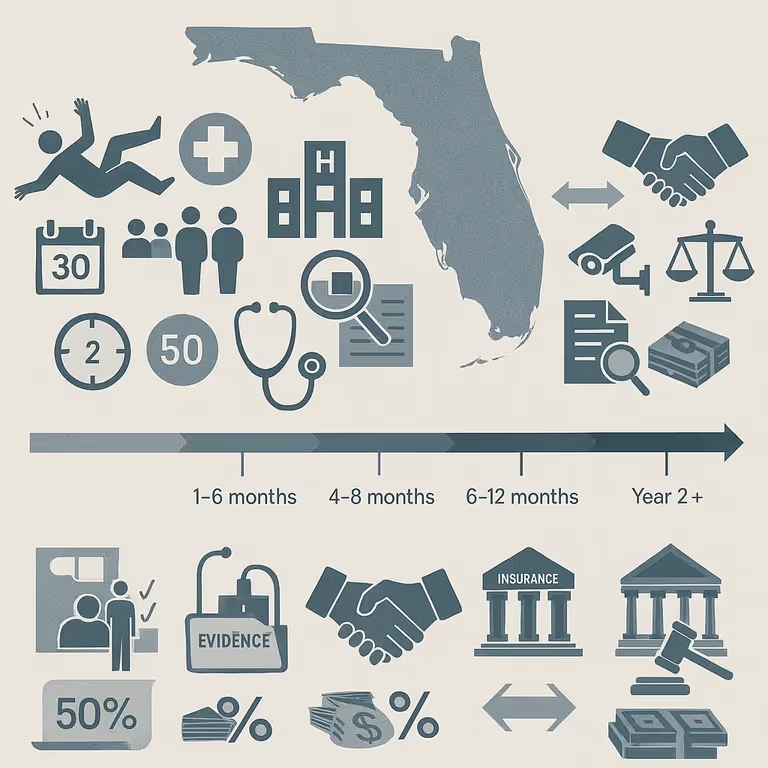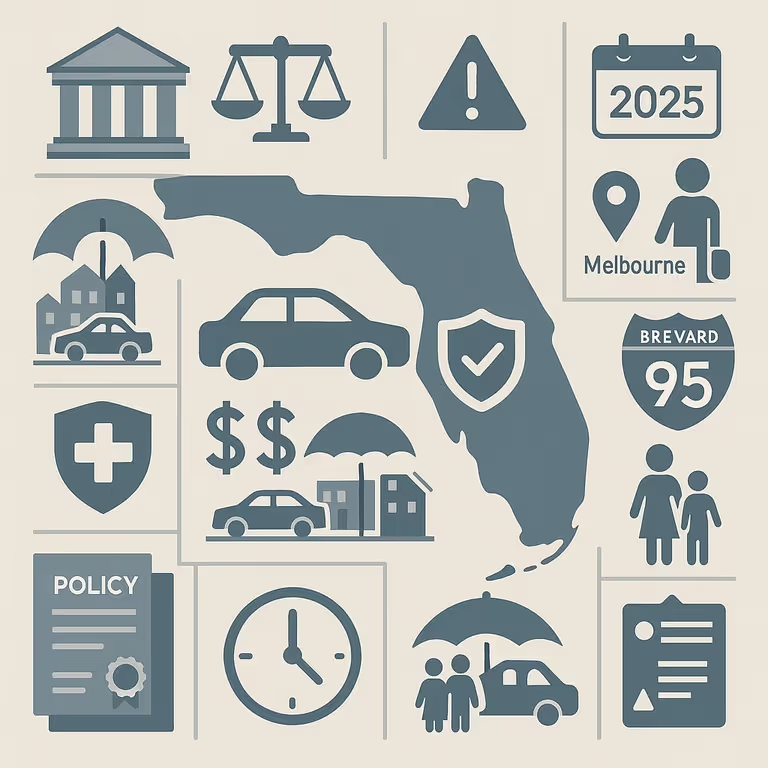What Counts as Bodily Injury Under Florida Law? A Comprehensive Guide
Discover Florida's bodily injury definitions, serious injury thresholds, and how they impact your insurance claims and legal rights after an accident.
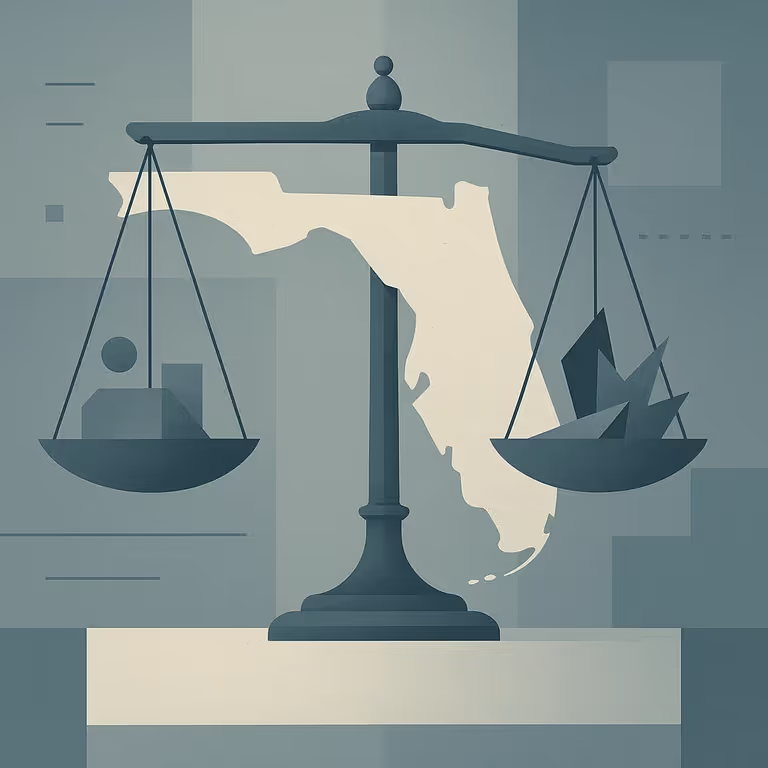
- Bodily injury ranges from minor soft tissue damage to life-threatening conditions, with specific definitions affecting legal options.
- Understanding serious versus general bodily injury determines compensation potential and ability to pursue claims beyond insurance.
- Immediate medical attention within 14 days and proper documentation are crucial for health recovery and legal protection.
Worried About Your Injury Case? We'll Review It - Free!
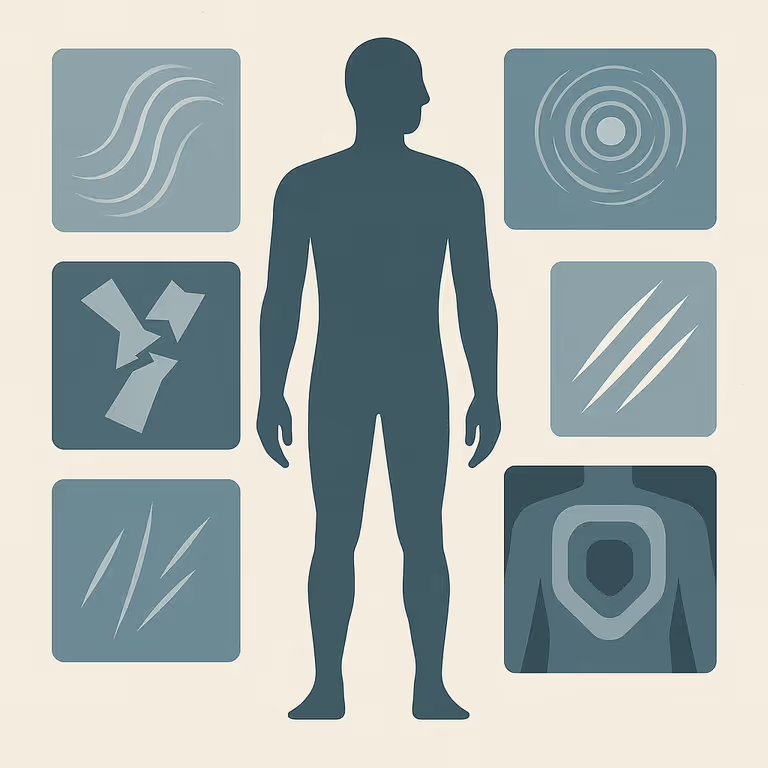

After a car accident, slip and fall, or other unexpected incident, one of the first questions injury victims ask is: "What exactly counts as bodily injury under Florida law?" This fundamental question affects everything from your insurance coverage to your legal rights and potential compensation. Understanding the legal definition of bodily injury is crucial for anyone who has been hurt in an accident in Florida, as it determines whether you can pursue claims beyond basic insurance coverage.
Understanding Bodily Injury Under Florida Law
In simple terms, bodily injury refers to any physical harm to a person's body, including both visible and invisible injuries. This broad definition encompasses everything from obvious wounds like cuts and broken bones to less apparent injuries such as soft tissue damage, concussions, or internal organ damage. The key distinction is that the injury must be physical in nature – affecting your body rather than just your property or emotions.
However, Florida law makes important distinctions between different types of bodily injury, particularly when it comes to legal proceedings and insurance claims. The most significant distinction is between general bodily injury and what Florida statutes define as "serious bodily injury."
Under Florida Statute 316.027, the law specifically defines serious bodily injury as "an injury to a person, including the driver, which consists of a physical condition that creates a substantial risk of death, serious personal disfigurement, or protracted loss or impairment of the function of any bodily member or organ." This legal threshold determines when more significant legal remedies become available and affects how insurance companies and courts evaluate your case.
The practical importance of understanding these definitions cannot be overstated. Your classification of injuries directly impacts your insurance coverage under Florida's no-fault system, your ability to step outside that system to pursue additional compensation, and the types of damages you may be able to recover. Whether you're dealing with a minor fender-bender or a catastrophic accident, knowing where your injuries fall within Florida's legal framework empowers you to make informed decisions about your medical care and potential legal claims.
For residents of Melbourne and Brevard County who find themselves injured in accidents, these legal distinctions take on immediate practical significance. Our experienced Melbourne car accident lawyers regularly help clients understand how Florida's bodily injury laws apply to their specific situations, ensuring they receive appropriate medical care while protecting their legal rights.
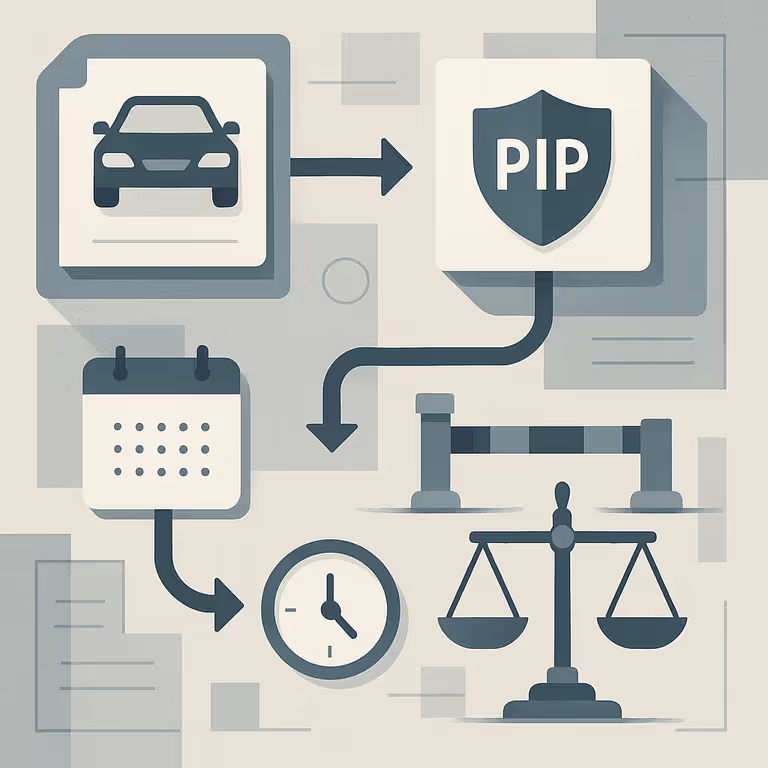
Florida accident victims can sustain a wide range of bodily injuries, each carrying different implications for medical treatment, insurance coverage, and potential legal claims. Understanding the various types of injuries that commonly occur in accidents helps injury victims recognize the significance of their condition and make informed decisions about their medical and legal options.
Common Types of Bodily Injuries in Florida Accidents
Soft Tissue Injuries represent some of the most common yet frequently underestimated bodily injuries in Florida accidents. These include whiplash, muscle strains, sprains, and ligament damage. While these injuries may not always be immediately visible on X-rays or CT scans, they can cause significant pain, limit mobility, and require extensive physical therapy. Whiplash, in particular, is notorious for symptoms that may not appear until days after an accident, making prompt medical evaluation crucial even when you initially feel fine.
Bone Fractures and Breaks constitute clearly documented bodily injuries that range from simple stress fractures to complex compound breaks requiring surgical intervention. These injuries typically involve obvious physical symptoms and require immediate medical attention. Fractures can affect any part of the body, from fingers and ribs to major bones like the femur or pelvis. The severity and location of the fracture significantly impact both recovery time and potential compensation in legal claims.
Head and Brain Injuries represent some of the most serious forms of bodily injury, ranging from mild concussions to severe traumatic brain injuries. Even seemingly minor head impacts can result in concussions that affect cognitive function, memory, and daily activities. More severe brain injuries can cause permanent disability, personality changes, and lifelong care needs. The full extent of brain injuries often becomes apparent only over time, making ongoing medical evaluation essential.
Lacerations and Cuts may seem straightforward, but they vary dramatically in severity and legal significance. Minor cuts requiring a few stitches differ substantially from deep lacerations that damage muscles, nerves, or tendons. Severe lacerations can result in permanent scarring, nerve damage, or loss of function, all of which factor into the evaluation of bodily injury claims.
Internal Injuries often represent the most dangerous category of bodily injury because they may not produce immediate obvious symptoms. Damage to internal organs, internal bleeding, or injuries to the digestive system can be life-threatening if not promptly diagnosed and treated. These injuries frequently require emergency surgery and can result in long-term complications or permanent damage.
It's crucial to understand that even seemingly minor injuries can develop into serious, long-term problems if not properly treated. Additionally, some injuries may not manifest symptoms immediately after an accident – a phenomenon known as delayed symptom presentation. This is why medical professionals and legal experts consistently recommend seeking prompt medical evaluation after any accident, regardless of how you initially feel.
Proper medical documentation from the beginning of your treatment creates a clear record of your bodily injuries, which proves essential for both your recovery and any potential legal claims. Our Brevard County serious injury attorneys work with medical professionals throughout Central Florida to ensure clients receive appropriate care while building strong documentation for their cases.
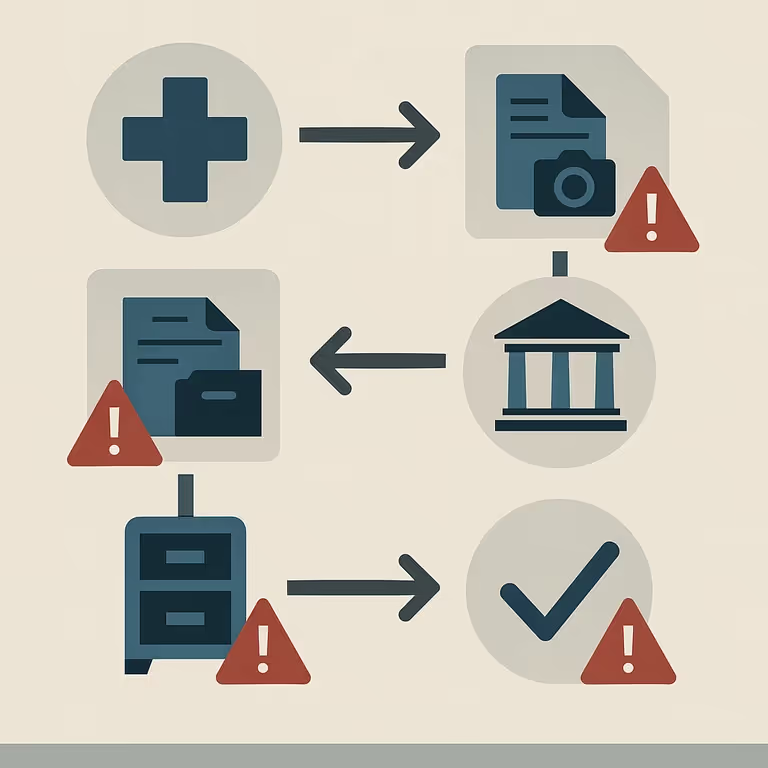
Understanding when your bodily injury qualifies for legal claims beyond basic insurance coverage is essential for Florida accident victims seeking full compensation for their losses. Florida's unique insurance system creates specific thresholds and requirements that determine when injured parties can pursue additional legal remedies.
When Bodily Injury Qualifies for Legal Claims Beyond Insurance
Florida operates under a Personal Injury Protection (PIP) system, also known as "no-fault" insurance, which requires all drivers to carry minimum coverage for bodily injury sustained in motor vehicle accidents. This system provides initial coverage for medical expenses and lost wages regardless of who caused the accident, but it also creates limitations on when injury victims can pursue claims against at-fault parties.
Under current Florida law, drivers must carry a minimum of $10,000 in PIP coverage and $10,000 in Property Damage Liability insurance. PIP coverage typically pays 80% of medical expenses and 60% of lost wages up to the policy limits. However, there's a crucial requirement: injury victims must seek medical treatment within 14 days of the accident to maintain their eligibility for PIP benefits.
The significance of the 14-day rule cannot be overstated. Even if you feel fine immediately after an accident, failing to seek medical attention within this timeframe can result in the complete loss of your PIP coverage. This requirement makes it essential to see a medical professional promptly, both for your health and to preserve your insurance benefits.
Beyond PIP coverage, Florida law allows injury victims to pursue additional compensation through lawsuits against at-fault parties, but only under specific circumstances. Victims can "step outside" the no-fault system when their injuries meet the serious injury threshold or when their economic losses exceed their PIP coverage limits.
Recent changes to Florida law have significantly impacted how bodily injury claims are evaluated. The 2023 tort reform legislation, House Bill 837, modified comparative negligence rules and introduced new requirements for personal injury claims. These changes affect how courts determine compensation when multiple parties share fault for an accident, potentially reducing awards for plaintiffs who bear partial responsibility for their injuries.
The new comparative negligence rule means that if you're found to be more than 50% at fault for your accident, you cannot recover any compensation from other at-fault parties. This represents a significant change from previous law and makes the investigation and documentation of accident circumstances more critical than ever.
For injuries that don't meet the serious injury threshold, victims may still pursue compensation if their medical expenses exceed their PIP coverage or if they've sustained permanent injuries that affect their daily activities. However, proving these elements requires thorough medical documentation and often expert testimony about the long-term impact of injuries.
Insurance companies frequently challenge claims that attempt to exceed PIP coverage, making it essential to document your bodily injuries properly from the beginning of treatment. This includes maintaining detailed medical records, following all prescribed treatments, and avoiding gaps in care that insurance companies might use to minimize your claim.
Understanding these complex interactions between insurance coverage and legal rights can be challenging for accident victims dealing with recovery from bodily injuries. Our comprehensive guide to Florida no-fault insurance provides additional details about navigating this system effectively.

Taking immediate and appropriate action after sustaining bodily injury in an accident is crucial for protecting both your health and your legal rights. The steps you take in the hours and days following an accident can significantly impact your medical recovery, insurance coverage, and potential legal compensation.
Protecting Your Rights After Sustaining Bodily Injury
Seek Immediate Medical Attention This should be your first priority after any accident, even if you don't feel seriously injured. This step is critical both for your health and for legal reasons. Many bodily injuries, particularly soft tissue injuries and concussions, may not produce immediate symptoms but can worsen without proper treatment. Additionally, Florida's 14-day rule for PIP insurance coverage makes prompt medical evaluation essential for preserving your insurance benefits.
Document All Injuries Thoroughly by taking photographs of visible injuries as soon as possible after the accident and continuing to document the healing process. Keep detailed records of all medical appointments, treatments, medications, and how your injuries affect your daily activities. This documentation becomes crucial evidence if you need to pursue legal claims beyond your insurance coverage.
Report the Accident Properly to law enforcement and your insurance company, but be careful about providing detailed statements without legal representation. While you're required to report accidents, you should avoid making statements that could be interpreted as admitting fault or minimizing your injuries. Stick to factual information about what happened and let medical professionals document the extent of your bodily injuries.
Preserve All Evidence Related to the Accident including photographs of the accident scene, vehicle damage, traffic conditions, and any relevant environmental factors. Collect contact information from witnesses and maintain copies of all accident reports, medical records, and correspondence with insurance companies. This evidence becomes increasingly important if your case proceeds beyond initial insurance claims.
Follow All Medical Treatment Recommendations consistently and completely. Insurance companies frequently look for gaps in medical treatment or failures to follow prescribed therapies as reasons to minimize claims. If cost is a concern, discuss payment options with your medical providers rather than skipping necessary treatment. Your health should be the primary concern, but consistent treatment also strengthens any potential legal claim.
Avoid Common Mistakes That Can Harm Your Claim by understanding what not to do after sustaining bodily injury. Don't provide recorded statements to insurance companies without consulting an attorney, especially statements to the other party's insurance company. Don't sign any settlement agreements without fully understanding their implications. Don't post about your accident or injuries on social media, as insurance companies regularly monitor social media accounts for information that might contradict injury claims.
Understand When to Consult With a Personal Injury Attorney – generally, the answer is sooner rather than later for any significant bodily injury. Initial consultations are typically free and can help you understand your rights without any obligation. An experienced attorney can guide you through the complex interactions between medical treatment, insurance coverage, and potential legal claims while you focus on recovery.
Continue Medical Treatment as Long as Necessary even if initial symptoms seem to improve. Some bodily injuries require ongoing treatment or may develop complications over time. Don't let concerns about insurance coverage limits or legal proceedings interfere with necessary medical care. Your attorney can work with medical providers to ensure you receive appropriate treatment while protecting your legal interests.
The complexity of Florida's insurance laws and recent legal changes make professional guidance particularly valuable for anyone who has sustained significant bodily injuries in an accident. Understanding your rights and options early in the process helps ensure you make informed decisions about your medical care and potential legal claims. For comprehensive guidance on immediate steps after an accident, our detailed resource on what to do after a car accident in Florida provides step-by-step instructions for protecting your interests.

Melbourne and Brevard County residents face unique considerations when dealing with bodily injuries from accidents, influenced by local traffic patterns, tourist populations, and specific regional factors that affect both accident frequency and legal proceedings.
Bodily Injury Considerations for Melbourne and Brevard County Residents
Local traffic safety data reveals ongoing challenges for Melbourne area residents. Recent statistics indicate that 15 people aged 65 or older were injured or killed in traffic crashes in 2024, highlighting the particular vulnerability of older residents to serious bodily injury in accidents. These statistics underscore the importance of understanding your legal rights and options if you become an accident victim in our community.
Brevard County has experienced evolving traffic patterns, with recent data showing a 7.5% decrease in total annual crashes during certain periods. However, specific locations like the Viera roundabout continue to see elevated crash rates, creating heightened risks for residents traveling familiar routes. Understanding these local risk factors can help residents make informed decisions about accident prevention while knowing their legal options if prevention fails.
Melbourne's location along major transportation corridors, including Interstate 95 and US Highway 1, creates unique challenges for accident victims. The mix of local commuters, tourists, and commercial vehicles increases the complexity of accident investigations and insurance claims. Tourist-related accidents often involve out-of-state insurance companies and drivers who may be unfamiliar with Florida's no-fault insurance requirements, potentially complicating the claims process for local residents.
The presence of major medical facilities in the Melbourne area, including Holmes Regional Medical Center and other specialized treatment centers, provides excellent resources for treating bodily injuries. However, residents should understand that the choice of medical providers can affect both the quality of care and the documentation needed for potential legal claims. Working with medical providers experienced in treating accident-related injuries and familiar with legal requirements for documentation can significantly benefit your case.
Local court procedures in Brevard County have their own rhythms and requirements that experienced local attorneys understand. The Eighteenth Judicial Circuit, which covers Brevard County, has specific procedures for personal injury cases that differ from other Florida jurisdictions. Having legal representation familiar with local court practices, judges, and opposing counsel can provide significant advantages in pursuing bodily injury claims.
Frequently Asked Questions About Florida Bodily Injury Law
What's the difference between bodily injury and personal injury in Florida?
Bodily injury specifically refers to physical harm to a person's body, while personal injury in legal contexts can include emotional, psychological, and other non-physical damages in addition to bodily injury. In many legal discussions, these terms are used interchangeably, but bodily injury focuses on the physical aspects of harm – cuts, bruises, broken bones, internal damage, and other tangible injuries to your body. Personal injury cases may include compensation for pain and suffering, emotional distress, and other impacts beyond the purely physical injuries.
How long do I have to file a bodily injury claim in Florida?
Florida's statute of limitations for most bodily injury claims is two years from the date of the accident for negligence-based claims. However, this timeframe can vary depending on the specific circumstances of your case, and certain situations may have shorter deadlines. It's crucial to act quickly rather than wait, as evidence can disappear, witnesses' memories fade, and medical records may become harder to obtain over time. Even if you're unsure about pursuing a claim, consulting with an attorney early preserves your options.
Can I still recover compensation if I was partially at fault for the accident?
Yes, but recent changes to Florida law have significantly impacted comparative negligence rules. Under the 2023 tort reform legislation, if you're found to be more than 50% at fault for the accident, you cannot recover any compensation from other at-fault parties. If you're 50% or less at fault, your compensation will be reduced by your percentage of fault. For example, if you're 30% at fault and your damages are $100,000, you would receive $70,000. This represents a major change from previous law and makes fault determination more critical than ever.
What if my bodily injury doesn't show symptoms immediately?
Delayed symptom presentation is common with many types of bodily injuries, particularly soft tissue injuries, concussions, and some internal injuries. This is exactly why Florida's 14-day rule for PIP coverage exists – the law recognizes that serious injuries may not be immediately apparent. Even if you feel fine right after an accident, it's essential to seek medical evaluation within 14 days to preserve your insurance coverage. If symptoms develop later, having that initial medical contact establishes the connection between your accident and your injuries.
Will my health insurance cover bodily injury treatment?
The interaction between health insurance, PIP coverage, and potential third-party claims can be complex. Generally, your PIP insurance should be the primary coverage for accident-related medical expenses up to your policy limits. Your health insurance may serve as secondary coverage or cover treatments that PIP doesn't include. However, if you later recover compensation through a legal claim, you may need to reimburse insurance companies that paid for your treatment. It's important to coordinate these benefits properly and understand any reimbursement obligations.
How do I prove the extent of my bodily injury?
Proving the extent of bodily injury requires comprehensive medical documentation, expert testimony, and sometimes additional evidence like day-in-the-life videos or testimony from family members about how injuries have affected your daily activities. Medical records, diagnostic tests, treatment records, and expert opinions from treating physicians form the foundation of injury documentation. For serious injuries, medical experts may testify about future medical needs, permanent limitations, and long-term prognosis. The key is working with medical providers who understand the importance of thorough documentation and following all recommended treatments consistently.
Key Takeaways
- Bodily injury in Florida ranges from minor soft tissue damage to life-threatening conditions, all potentially covered under law with specific definitions that affect your legal options
- Understanding the distinction between general and serious bodily injury affects your compensation potential and ability to pursue claims beyond basic insurance coverage
- Immediate medical attention within 14 days and proper documentation are crucial for both health recovery and legal protection under Florida's no-fault insurance system
- Florida's recent legal changes and complex insurance laws make professional guidance particularly valuable for significant injury cases in the Melbourne and Brevard County area
Understanding bodily injury definitions and their legal implications empowers Florida residents to make informed decisions about medical treatment, insurance claims, and potential legal action. While the laws are complex and the stakes are high, proper knowledge and professional guidance can help ensure that accident victims receive appropriate compensation for their injuries and losses.
If you've sustained bodily injuries in an accident in Melbourne or anywhere in Brevard County, our experienced legal team at Douglas R. Beam P.A. stands ready to help you understand your rights and pursue the compensation you deserve. With decades of experience handling bodily injury cases in Central Florida and over $1 billion in verdicts and settlements, we provide the expertise and personal attention your case deserves. Contact our Melbourne personal injury team today for a free consultation to discuss your specific situation and learn about your legal options.
This article provides general information and is not a substitute for legal advice. Laws can change, and the details of your situation matter. For personalized guidance, please contact a qualified Florida personal injury attorney.
Not Sure What To Do Next? We Can Help – Fast & Free.
Worried About Your Injury Case?
We'll Review It - Free
Don’t miss an article
Florida law, local insights, and the occasional dog pic.
Delivered straight to your inbox.
More articles
Browse all articlesFree Case Review
Get a complimentary review of your case

.webp)
.png)
.png)
.png)

